September 2, 2013 by Steve
Sometimes the simplest things in life can be the best. And while sometimes you need fifteen buttons to play a game, sometimes you only need two. Today we'll be reviewing the two-button fighting game, Divekick. Originally envisioned and created by a tiny team of gamers in the fighting game community, Divekick seeks to break down the complex fighting game into a single move, a jumping downwards kick (or divekick). First conceived very late at night after a tournament ("hey, wouldn't it be hilarious to make a game where you can only divekick?"), it ran through a successful kickstarter campaign, cancelled that campaign since they found a publisher, successfully got greenlit on Steam, and now released on Steam/PSN/Vita. Not bad at all for its origins.
Read moreJune 5, 2013 by Steve
What does it mean to be a god if no one will listen to you? Arcen Games looks at this with a bit of humor in their latest release, Skyward Collapse. Here, we play an omniscient, omnipresent celestial being, tasked with cultivating and manipulating two factions that would like nothing more than to see the other eradicated. That's an interesting scenario on its own, but we are further entangled by a godly need for entertainment (conflict) and plagued by natural "woes." To further jumble our troubles, rogue elements including deities and mythological creatures try to spoil our day. In this turn based strategy/god sim, we inherit the intriguing situation of lacking direct control yet commanding plenty of manipulation.
Read moreApril 18, 2013 by Steve
Well, I was not entirely ready for this. The Cat Lady, released last year by Screen 7 and created almost entirely by Remigiusz Michalski, was absolutely no where on my radar until I recently saw a preview of it in action. I suppose this isn't overly surprising. Michalski's and his studio, Harvester Games, have only developed two titles. The first, released in 2009, is called Downfall and is apparently both highly acclaimed and fairly successful. The second is this game, The Cat Lady. Both are created in Adventure Game Studio and are horror adventures, further limiting the client base (unless you have the media strength of The Walking Dead).
Yet, this ended up being one of the most interesting and complete titles I've played in ages. And somehow, that's even more satisfying when it's a complete surprise. It feels like this game has been stirring and simmering over the course of many years, and that probably isn't very far from the truth. This is an unbelievably mature experience, most likely the most mature game I've ever played. Many of the themes are very dark and complex and real, and this is one of the few instances I can imagine where an age/user discretion is actually warranted. And that can also be a bit of a warning for the rest of this article.
Read moreNovember 9, 2012 by Steve
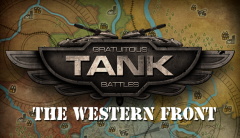 Gratuitous Tank Battles is a unique take on tower-strategy mechanics, created by a man who clearly has a strong attention to detail. This article will be covering both the base game, released this past May, and its expansion The Western Front, which is being released this today on Steam. Both are developed by Positech Games, which is more or less known as Cliff "cliffski" Harris. At first glance, GTB appears to be a standard tower defense game covered in a fine finish, but things quickly become more complicated. For a bit of background reading, we do also have a preview of the game which goes over the basics from a different point of view.
Gratuitous Tank Battles is a unique take on tower-strategy mechanics, created by a man who clearly has a strong attention to detail. This article will be covering both the base game, released this past May, and its expansion The Western Front, which is being released this today on Steam. Both are developed by Positech Games, which is more or less known as Cliff "cliffski" Harris. At first glance, GTB appears to be a standard tower defense game covered in a fine finish, but things quickly become more complicated. For a bit of background reading, we do also have a preview of the game which goes over the basics from a different point of view.
August 10, 2012 by Steve
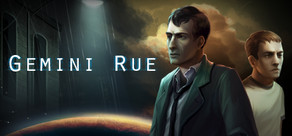 Gemini Rue. Duality + regret. A remarkably thoughtful and fitting name for this game (and certainly much more pleasing than the original Boryokudan Rue). Another entry in the monstrous Wadjet Eye Games adventure lineup and primarily the child of Joshua Nuernberger, Gemini Rue has been very well received since its release in early 2011. The game takes place in a futuristic sci-fi world with some touches of cyberpunk thrown in. As with other recent Wadjet games, it is a full experience complete with voice acting and attempts to push the underlying Adventure Game Studio engine as far as it can. As a whole, their efforts greatly pay off, riding on the strength of the characters and overarching story.
Gemini Rue. Duality + regret. A remarkably thoughtful and fitting name for this game (and certainly much more pleasing than the original Boryokudan Rue). Another entry in the monstrous Wadjet Eye Games adventure lineup and primarily the child of Joshua Nuernberger, Gemini Rue has been very well received since its release in early 2011. The game takes place in a futuristic sci-fi world with some touches of cyberpunk thrown in. As with other recent Wadjet games, it is a full experience complete with voice acting and attempts to push the underlying Adventure Game Studio engine as far as it can. As a whole, their efforts greatly pay off, riding on the strength of the characters and overarching story.
June 22, 2012 by Steve
 After playing Penumbra: Overture, everyone knew a sequel was on its way. The ending leaves scores of questions unanswered and perfectly prepares a follow-up. In 2008, Frictional Games released Penumbra: Black Plague, and in many ways, Black Plague does make the original feel like a mere overture. Frictional well heeded feedback following Overture's release and significantly tuned up their product in regards to pacing, controls, physics, and character interaction. All while continuing the fantastically creepy atmosphere and adding significant new elements to the story.
After playing Penumbra: Overture, everyone knew a sequel was on its way. The ending leaves scores of questions unanswered and perfectly prepares a follow-up. In 2008, Frictional Games released Penumbra: Black Plague, and in many ways, Black Plague does make the original feel like a mere overture. Frictional well heeded feedback following Overture's release and significantly tuned up their product in regards to pacing, controls, physics, and character interaction. All while continuing the fantastically creepy atmosphere and adding significant new elements to the story.
April 25, 2012 by Steve
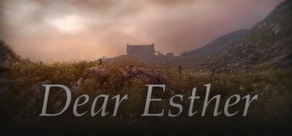 I first became aware of Dear Esther on the day it was released, as news passed that it recouped its Indie Fund investment in a mere six hours. Somehow, I entirely missed word of the game prior to that, but as I read more, I knew I had to play it. While it will take multiple playthroughs to obtain the game's full experience (due to semi-randomized dialogue), I came away a bit underwhelmed by the game. I normally eat up intentionally vague/confusing dialogue-based stories, but this story seems a bit more pedestrian than most (even if the vagueness fully makes sense within the story). But this in no way takes away from the game's other draw; its relentlessly gorgeous handcrafted visuals, with each frame packed in detail.
I first became aware of Dear Esther on the day it was released, as news passed that it recouped its Indie Fund investment in a mere six hours. Somehow, I entirely missed word of the game prior to that, but as I read more, I knew I had to play it. While it will take multiple playthroughs to obtain the game's full experience (due to semi-randomized dialogue), I came away a bit underwhelmed by the game. I normally eat up intentionally vague/confusing dialogue-based stories, but this story seems a bit more pedestrian than most (even if the vagueness fully makes sense within the story). But this in no way takes away from the game's other draw; its relentlessly gorgeous handcrafted visuals, with each frame packed in detail.
April 11, 2012 by Steve
 Fresh on the heels of the well-received The Blackwell Legacy arrives Blackwell Unbound. After playing and thoroughly enjoying the first for our Indie Impression feature, continuing was an inevitability. For reference, Legacy was released in 2006, and Unbound in 2007. There have since been two more releases in the semi-episodic series, so I'm still a bit behind. I am playing the re-released versions in the Blackwell Bundle, which offer improved voice acting as well as bug fixes and some extras. The Blackwell series (as well The Shivah) were primarily developed by Dave Gilbert and his studio, Wadjet Eye Games.
Fresh on the heels of the well-received The Blackwell Legacy arrives Blackwell Unbound. After playing and thoroughly enjoying the first for our Indie Impression feature, continuing was an inevitability. For reference, Legacy was released in 2006, and Unbound in 2007. There have since been two more releases in the semi-episodic series, so I'm still a bit behind. I am playing the re-released versions in the Blackwell Bundle, which offer improved voice acting as well as bug fixes and some extras. The Blackwell series (as well The Shivah) were primarily developed by Dave Gilbert and his studio, Wadjet Eye Games.
For ease of writing, I'm just going to assume that you don't mind to be aware of mild spoilers in the first act of the first game. After all, it's printed everywhere, including the covers of these very games. Essentially, the Blackwell series is about the generational history of this family who has been "blessed" to be mediums to the restless spirit world. In the case of the Blackwells, they have been assigned by the powers that be to a ghost detective named Joey Malone. He is forced to stay with his medium at all times and guide them towards restless ghosts in the world who have, for one reason or another, been unable to pass on into the afterlife.
During Legacy, we played as Rosangela, the newest medium in the Blackwell family. She has to fight through a bit of family history as well as her own personal weaknesses, before encountering her family's legacy. In Unbound, we travel back to her aunt, Lauren, who has already met and come to terms with Joey.
Read moreJanuary 13, 2012 by Steve
 If someone tells you they're going to do a "reverse" something, odds are the result will be terrible. The concept sounds similarly cheesy for games, evoking memories of bad minigames and multiplayer modes. However, for some genres it actually could be a fresh take on the concept, and 11-Bit Studios tries to prove this with their "reverse tower defense" game, Anomaly: Warzone Earth. 11-Bit is a brand new developer out of Poland, powered by a small team of industry veterans. It appears that they've taken an independent mindset towards publishing and distributing, releasing Anomaly directly to Steam and the Mac Store. Thus far, they seem to be having a good deal of success and are proving capable in quickly porting their game to new platforms, including iOS, Kindle Fire (!) and an upcoming XBLA release.
If someone tells you they're going to do a "reverse" something, odds are the result will be terrible. The concept sounds similarly cheesy for games, evoking memories of bad minigames and multiplayer modes. However, for some genres it actually could be a fresh take on the concept, and 11-Bit Studios tries to prove this with their "reverse tower defense" game, Anomaly: Warzone Earth. 11-Bit is a brand new developer out of Poland, powered by a small team of industry veterans. It appears that they've taken an independent mindset towards publishing and distributing, releasing Anomaly directly to Steam and the Mac Store. Thus far, they seem to be having a good deal of success and are proving capable in quickly porting their game to new platforms, including iOS, Kindle Fire (!) and an upcoming XBLA release.
September 7, 2011 by Steve
 Plants vs. Zombies is a game I've been eyeing for a while. It regularly tempted me at $10 Steam with even cheaper sale prices. This summer's sale finally put me over the edge. Every so often you need some good tower defense action, and PvZ seemed like a unique yet highly praised take on the genre. Its cartoonish, Popcap/flash feel and simple five-lane setup makes things perfect for beginners. And it has enjoyed massive success over a huge variety of platforms. Originating on PC, PvZ has since expanded to every modern platform imaginable, both traditional and mobile. Popcap is undeniably a casual gaming powerhouse. The Bejeweled and Feeding Frenzy creators certainly know how to make products and pricing that clicks with the average consumer. They've been so successful that EA recently purchased the company for ~$750 million.
Plants vs. Zombies is a game I've been eyeing for a while. It regularly tempted me at $10 Steam with even cheaper sale prices. This summer's sale finally put me over the edge. Every so often you need some good tower defense action, and PvZ seemed like a unique yet highly praised take on the genre. Its cartoonish, Popcap/flash feel and simple five-lane setup makes things perfect for beginners. And it has enjoyed massive success over a huge variety of platforms. Originating on PC, PvZ has since expanded to every modern platform imaginable, both traditional and mobile. Popcap is undeniably a casual gaming powerhouse. The Bejeweled and Feeding Frenzy creators certainly know how to make products and pricing that clicks with the average consumer. They've been so successful that EA recently purchased the company for ~$750 million.
For the most part, PvZ exemplifies this success. It creates a casual-friendly atmosphere with calculated progressive learning combined with enough longevity and a tad of optional difficulty to round out the complete package. The game starts slowly, at first holding your hand with only a couple plant options (towers) available to defend your house from a weak zombie horde on a completely barren level. With only five lanes to defend, beginners will learn quickly what it takes to operate. In case they make mistakes, the game includes a get-out-of-jail-free card, in the form of zombie-clearing machines that activate and clear the lane should a zombie make it past the plants. For a while, the game introduces a new plant on almost every level, encouraging the player to try them out and discover what they're worth. Soon enough, juggling several plant types on more obnoxious levels will be a requirement.
Read moreJuly 20, 2011 by Steve
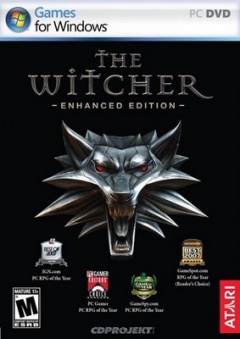 Very rarely do developers aim to make AAA PC exclusives anymore. As one of the most well regarded action-rpgs in recent history and aided by numerous recommendations, I felt it was my duty to try The Witcher. Its developer, CD Projekt, is a Polish firm who's been translating and publishing PC games since the mid-90s. Recently they've been spending money to expand, opening up the RED STUDIO for game development and creating Good Old Games as a DRM-free retro gaming service for modern computers.
Very rarely do developers aim to make AAA PC exclusives anymore. As one of the most well regarded action-rpgs in recent history and aided by numerous recommendations, I felt it was my duty to try The Witcher. Its developer, CD Projekt, is a Polish firm who's been translating and publishing PC games since the mid-90s. Recently they've been spending money to expand, opening up the RED STUDIO for game development and creating Good Old Games as a DRM-free retro gaming service for modern computers.
So far, only The Witcher and its sequel have been released by the studio, with Witcher coming out in October 2007 and Assassins of Kings hitting just two months ago (in May 2011). These projects are large in scope, using source material from a Polish novel series and brought to life by large development teams. The Witcher immediately brings a fresh start to the tale as our hero Geralt mysteriously reappears with amnesia, after apparently being killed by an angry mob. So let's see how this story goes. I'm playing the latest version, the Enhanced Edition Director's Cut.
Read moreMay 9, 2011 by Steve
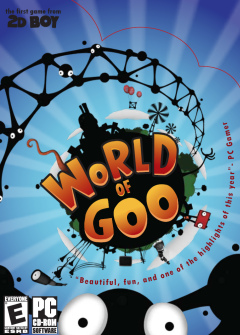 As one of the forerunners of the modern indie game movement (along with Braid), World of Goo demands to be played. Created almost entirely by two individuals on a miniscule budget (2D Boy), it has since gone on to spawn several ports while receiving numerous accolades. I'm a bit late to this party, but its resumé speaks for itself. With incredibly high 90%+ aggregate scores, it has been universally praised as a near-flawless game. Greg has given it a similarly stellar 9/10. PC and Wii first claimed the game in October 2008, followed by OSX in November, Linux in early 2009 and iOS in 2010.
As one of the forerunners of the modern indie game movement (along with Braid), World of Goo demands to be played. Created almost entirely by two individuals on a miniscule budget (2D Boy), it has since gone on to spawn several ports while receiving numerous accolades. I'm a bit late to this party, but its resumé speaks for itself. With incredibly high 90%+ aggregate scores, it has been universally praised as a near-flawless game. Greg has given it a similarly stellar 9/10. PC and Wii first claimed the game in October 2008, followed by OSX in November, Linux in early 2009 and iOS in 2010.
All that's left to do is try it out for myself, two-plus years after the fact. Could my personal thoughts and feelings for the game live up to its lofty accolades?
Read moreApril 18, 2011 by Steve
![]() Not often will games come along and surprise you these days. In our age of information, developers and publishers go to great lengths to push their products. Specifically, they hope to get fans hyped enough to buy the game day 1 as well as keeping the title in the public mind for continued spontaneous purchases of their product. This is why we're rarely surprised and blown away by a game. For me, VVVVVV was that type of game.
Not often will games come along and surprise you these days. In our age of information, developers and publishers go to great lengths to push their products. Specifically, they hope to get fans hyped enough to buy the game day 1 as well as keeping the title in the public mind for continued spontaneous purchases of their product. This is why we're rarely surprised and blown away by a game. For me, VVVVVV was that type of game.
December 6, 2010 by Steve
 Alan Wake has been a long time coming. After Max Payne 2 released in 2003, Remedy has used the majority of their resources for this game. Originally announced in 2005, it has naturally undergone significant revisions. Once a freeroaming affair, Alan Wake is now almost entirely linear. Instead of releasing on consoles and PC, Remedy ended up partnering with Microsoft for an exclusive 360 release. As one would expect from a partnership, the game got bigger and bigger and eventually ended up being a high-profile, big-budget release when it finally hit in May 2010. Such a big game for a small company would carry with it many risks and increasingly impatient onlookers. Is the survival-horror tale worth the wait in the end? Is the Alan Wake concept still relevant and contemporary enough several years later? Most importantly, is the game good and does it work? Let's take a dive into the darkness...
Alan Wake has been a long time coming. After Max Payne 2 released in 2003, Remedy has used the majority of their resources for this game. Originally announced in 2005, it has naturally undergone significant revisions. Once a freeroaming affair, Alan Wake is now almost entirely linear. Instead of releasing on consoles and PC, Remedy ended up partnering with Microsoft for an exclusive 360 release. As one would expect from a partnership, the game got bigger and bigger and eventually ended up being a high-profile, big-budget release when it finally hit in May 2010. Such a big game for a small company would carry with it many risks and increasingly impatient onlookers. Is the survival-horror tale worth the wait in the end? Is the Alan Wake concept still relevant and contemporary enough several years later? Most importantly, is the game good and does it work? Let's take a dive into the darkness...
November 18, 2010 by Steve
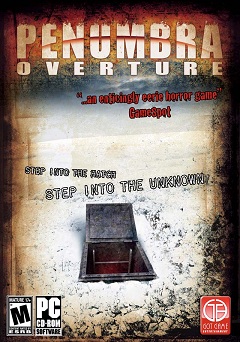 Atmosphere. Danger. Environment. Expectation. These words are integral to any sort of horror-based media, and yet many have seemingly forgotten all about the reasons behind fear and instead rely on cheap tactics to do the job. Penumbra: Overture shows a much more sophisticated ability to keep players on edge without relying on grotesque visuals and cheap 'jump moments' to elicit responses. I was particularly curious as to how this game could effect me since I'm not easily frightened and cheap attempts at fear usually seem more humorous than scary. And overall, the game does a fairly good job at its goals. Let me explain.
Atmosphere. Danger. Environment. Expectation. These words are integral to any sort of horror-based media, and yet many have seemingly forgotten all about the reasons behind fear and instead rely on cheap tactics to do the job. Penumbra: Overture shows a much more sophisticated ability to keep players on edge without relying on grotesque visuals and cheap 'jump moments' to elicit responses. I was particularly curious as to how this game could effect me since I'm not easily frightened and cheap attempts at fear usually seem more humorous than scary. And overall, the game does a fairly good job at its goals. Let me explain.
Overture almost takes advantage of those modern media shortcuts to create a fully engrossing experience with the capability to be legitimately frightening. As a response to these movies, shows, and games, your mind now expects something to happen when you travel down a dark hallway, into a new room, or when encountering an enemy. Instead, nothing typically happens in Penumbra. In fact, very little "happens" throughout the whole game. Almost all of the happenings and story events involve Phillip sorting out the past of his forgotten surroundings instead of building the story himself or primarily creating a story. At heart, Overture is a first-person adventure game, with the atmosphere as really the only major demarker to the survival-horror tag. I can recall only a handful of actual "events" Phillip was directly involved in. And yet this feels perfectly fine in the context of the game.
Read moreNovember 2, 2010 by Steve
 Welcome to another Audio-Visual Experience, brought to you by the First Hour. Again, these articles are specially created and intended to give you a varied, concrete experience of the game's sights and sounds without having to actually play the game yourself. Whether you haven't played the game or have already completed it but need a reminder or some nostalgia, this experience is for you. However, if you think you may play the game anytime in the near future and would prefer not to be spoiled, you should probably avoid this article, as it contains direct spoilers at times, up to and including the ending. For a complete first hour experience, you can view the first hour of Penumbra: Overture.
Welcome to another Audio-Visual Experience, brought to you by the First Hour. Again, these articles are specially created and intended to give you a varied, concrete experience of the game's sights and sounds without having to actually play the game yourself. Whether you haven't played the game or have already completed it but need a reminder or some nostalgia, this experience is for you. However, if you think you may play the game anytime in the near future and would prefer not to be spoiled, you should probably avoid this article, as it contains direct spoilers at times, up to and including the ending. For a complete first hour experience, you can view the first hour of Penumbra: Overture.
So sit back and enjoy the stylings of survival horror masters Frictional Games in their original release, Penumbra: Overture.
Read more
October 29, 2010 by Steve
 Just in time for Halloween, we have a special first hour of Penumbra: Overture. Released in 2007 by indie developer Frictional Games, Penumbra: Overture is the first in a trilogy that promises to be a uniquely frightening experience. As part survival horror, part puzzle solver and part first person shooter, initial previews evoke thoughts of Half-Life 2 infused with terror, which is just fine with us. I've heard great things about the game for a while, mostly from flattering word-of-mouth. This is as good a time as any, after purchasing it from the Humble Indie Bundle several months ago.
Just in time for Halloween, we have a special first hour of Penumbra: Overture. Released in 2007 by indie developer Frictional Games, Penumbra: Overture is the first in a trilogy that promises to be a uniquely frightening experience. As part survival horror, part puzzle solver and part first person shooter, initial previews evoke thoughts of Half-Life 2 infused with terror, which is just fine with us. I've heard great things about the game for a while, mostly from flattering word-of-mouth. This is as good a time as any, after purchasing it from the Humble Indie Bundle several months ago.
For this first hour playthrough, we've trying something a bit different. I played through and recorded the initial first hour and then sent the video to Greg, who then watched and wrote what he saw and felt during the run. I was curious in seeing how his experience would differ from mine, especially since third-person impressions are so important to overall game opinion, especially when it comes to making purchasing decisions. So I'll hand this off to Greg (while adding some extra comments I deem appropriate) and then bring it back for the conclusion.
If you wish, you can follow along yourself with the provided Youtube videos. Apologies about the graphical and slight sound sync issues, but you can blame Youtube for those.
Read moreOctober 20, 2010 by Steve
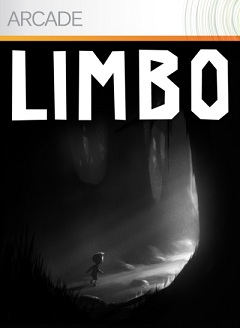 Theologically, limbo exists as a state of divine neutrality, a residence between heaven and hell. Limbo by Playdead Studios displays this fuzzy pseudo-reality in its presentation, but with a sinister twist. This limbo can be cruel, grewsome and even downright evil. Bear traps randomly lie on the ground, forever waiting just for you alone to trigger them. Giant spiders hide in caves, hoping you'll wander close enough for them to skewer with their giant legs. In Limbo, ghost children satisfy their concept of play by settingup guilottines and buzzsaws to shred you. This game is in no way particularly kind.
Theologically, limbo exists as a state of divine neutrality, a residence between heaven and hell. Limbo by Playdead Studios displays this fuzzy pseudo-reality in its presentation, but with a sinister twist. This limbo can be cruel, grewsome and even downright evil. Bear traps randomly lie on the ground, forever waiting just for you alone to trigger them. Giant spiders hide in caves, hoping you'll wander close enough for them to skewer with their giant legs. In Limbo, ghost children satisfy their concept of play by settingup guilottines and buzzsaws to shred you. This game is in no way particularly kind.
However, that cruel nature only adds to the atmosphere as the player must remain constantly aware of the presense of death in this bizarre, mysterious minimalist world. In this world and state of existence, death is the norm. Beginning as a stylistic proof of concept by a disgruntled game artist named Arnt Jensen, the concept soon flourished into a full game as Jensen subsequently co-founded Playdead Studios with Dino Patti to develop his idea. Originally planned for a PC release, Playdead was able to procure Dutch government grants and investor support while eventually deciding on an Xbox Live Arcade release, likely to avoid piracy worries and possibly for 360 exclusivity bonuses provided by Microsoft. The game eventually released this summer on July 21st during the 360's "Summer of Arcade." So, how does the final product match atmosphere and action? Does the constant presence of death help or hurt player mood and motivation? Let's take a deeper look and try to decide.
Read moreOctober 4, 2010 by Steve
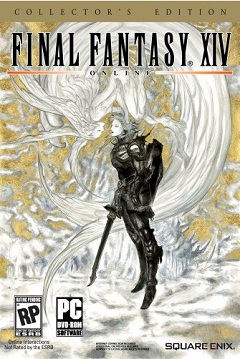 Without question, Final Fantasy XI deviated strongly from MMO traditions and norms. In doing so, it managed to greatly polarize the community. By moving at a slow, calculated pace throughout (even for an MMO) and requiring players to rely on others to accomplish the most simple goals, many players were forever turned off, including Greg and myself. Past level 15, players required a party to do any sort of leveling. Many damage-dealing classes were simply not wanted and sat in the main city for hours until they could find a group, while tanks, healer and support classes were welcomed into parties within seconds. The economy was absolutely broken, with incredible inflation stemming from gil selling and the gap between rich and poor players. Farming for money (outside of instanced colliseum-style fights) consisted of sitting at rare spawn locations for hours along with the other farmers and bots, just hoping that you manage to attack the monster before anyone else and then praying that it would drop what you wanted. Simply put, the game had a lot of glaring problems that pushed people away.
Without question, Final Fantasy XI deviated strongly from MMO traditions and norms. In doing so, it managed to greatly polarize the community. By moving at a slow, calculated pace throughout (even for an MMO) and requiring players to rely on others to accomplish the most simple goals, many players were forever turned off, including Greg and myself. Past level 15, players required a party to do any sort of leveling. Many damage-dealing classes were simply not wanted and sat in the main city for hours until they could find a group, while tanks, healer and support classes were welcomed into parties within seconds. The economy was absolutely broken, with incredible inflation stemming from gil selling and the gap between rich and poor players. Farming for money (outside of instanced colliseum-style fights) consisted of sitting at rare spawn locations for hours along with the other farmers and bots, just hoping that you manage to attack the monster before anyone else and then praying that it would drop what you wanted. Simply put, the game had a lot of glaring problems that pushed people away.
Years after its original Japanese and subsequent North American release, FFXI began changing significantly, modifying nearly everything and adding features to appear more tempting to the average gamer, especially once under the shadow of MMORPG behemoth World of Warcraft. FFXI has always enjoyed a degree of success, as a profitable long-running MMO with a stable user base. However, it has not gained significant market share either. By hearing customer feedback for the past few years as well as observing current MMO trends, Square-Enix is surely hoping that they'll be able to grab more of that growing market with Final Fantasy XIV. But how much have things really changed? Have they fixed the basic and more complicated issues that people had with XI? I was genuinely curious and tried out the beta for just this reason. Here's what I've found...
Read moreSeptember 27, 2010 by Steve
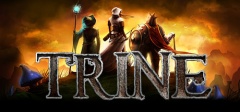 Trine is the kind of game you can't help but wish came along more often, as a rare legitimate platformer. Frozenbyte (along with certain notable indie developers) shows us that 2d platforming is in fact not dead and can be pushed as far as you'll willing to take it. Perhaps most impressively, Trine is in elite company as one of the few download-centric titles that could be mistaken as a traditional retail release.
Trine is the kind of game you can't help but wish came along more often, as a rare legitimate platformer. Frozenbyte (along with certain notable indie developers) shows us that 2d platforming is in fact not dead and can be pushed as far as you'll willing to take it. Perhaps most impressively, Trine is in elite company as one of the few download-centric titles that could be mistaken as a traditional retail release.
For example, check a screenshot of some random game. You likely see an area with a background, or maybe walls or repeating buildings. Perhaps an enemy or two are in the frame and an interactive objects of note. Now take a look at random screenshot of Trine. You see a struggling forest that has been encroached on by both technology and a plague of death. The foreground partially hides you in sparse blades of grass, a handful of flowers, and a large warped tree root. In the background, multiple metallic gears are encrusted into the hill, which is itself overlooked by a towering mountain. The sunlight beaming from above onto wild mushrooms is nothing but welcoming as your knight just escaped from the cave and is heading to a well-constructed but still wobbly bridge up ahead. While one could say such lush descriptions could be extrapolated out of any image; to me, the difference is clear. Trine tries to feed your imagination and create an organic, living environment. While the experience does not stay fully fresh the entire way, Trine has more than enough creativity and character to deserve a second look, as noted in our earlier first hour playthrough.
Read moreSeptember 13, 2010 by Steve
 What would you think when told of a game combining elements of pachinko, Arkanoid and Puzzle Bobble? Like me, you'd probably be a bit confused. Probably something involving balls being shot and bounced around. The concept was interesting enough to try when we received a request to review the Caelum by ApGames. The upstart Swedish developers recently released their self-proclaimed "addictive physics-based arcade game." So let's get right into it and see how the unique gameplay combinations measure up.
What would you think when told of a game combining elements of pachinko, Arkanoid and Puzzle Bobble? Like me, you'd probably be a bit confused. Probably something involving balls being shot and bounced around. The concept was interesting enough to try when we received a request to review the Caelum by ApGames. The upstart Swedish developers recently released their self-proclaimed "addictive physics-based arcade game." So let's get right into it and see how the unique gameplay combinations measure up.
July 9, 2010 by Steve
Few things in the gaming world are as controvertial as game reviews themselves. Fanboys and fangirls wait with bated breath to peek at the scores for their most anticipated games. If these scores aren't as high as their expectations, some of them are apt to explode, whether at writers, publishers, comment boxes, or at developers themselves. Unfortunately, what would seem to be a simple subjective scoring has now turned into an important industry, as the likelyhood of developers and publishers could be impacted by such things. Thus we have our current situation, where games are often reviewed as exacting and objectively as possible. However, does this even remotely mirror the experience of the end user and help the customer in deciding how to spend their money? I argue that this is fundamentally flawed and that we can find a better way, both for the developers and the consumers.
Read moreJuly 1, 2010 by Steve
 It should be little surprise for anyonewho knows me that my most exciting development from E3 was the unveiling of Child ofEden. Kept hidden for two years in development, Tetsuya Mizuguchi, Q? Entertainment and Ubisoft(with a little help from Joel McHale) announced the title to the world to start off the Ubi conference. Mizuguchi took the lead, presenting a demo level paired with the 360's Kinect motion capturesystem. While most detailed information on the title is still sparse and hard to find,bits and pieces of information are beginning to sift around, most of which sound quite promising. Here is what we know sofar...
It should be little surprise for anyonewho knows me that my most exciting development from E3 was the unveiling of Child ofEden. Kept hidden for two years in development, Tetsuya Mizuguchi, Q? Entertainment and Ubisoft(with a little help from Joel McHale) announced the title to the world to start off the Ubi conference. Mizuguchi took the lead, presenting a demo level paired with the 360's Kinect motion capturesystem. While most detailed information on the title is still sparse and hard to find,bits and pieces of information are beginning to sift around, most of which sound quite promising. Here is what we know sofar...
May 24, 2010 by Steve
 As mentioned in my previous article,Street Fighter 4 has become THE fighting game phenomenon of recentyears, and with good reason. Released to consoles early 2009 andbacked by a fantastic media campaign, Capcom gave fans a stunning,well-balanced mix of old and new. Refreshing the memories of oldfans while simultaneously creating new ones, the fighting game wasresurrected.
As mentioned in my previous article,Street Fighter 4 has become THE fighting game phenomenon of recentyears, and with good reason. Released to consoles early 2009 andbacked by a fantastic media campaign, Capcom gave fans a stunning,well-balanced mix of old and new. Refreshing the memories of oldfans while simultaneously creating new ones, the fighting game wasresurrected.
Its update/sequel/expansion recentlyhit stores in April, offering new characters, new ultras, and afantastic replay system along with improved online matchmaking andplay. As I do not actually own a copy of the game, this article willonly be my initial impressions on these topics. Currently releasedon 360 and PS3, an arcade version is planned for the near future,with a PC version yet unannounced and conspicuously absent.
Read moreMay 3, 2010 by Steve
 Today's first hour review is for Trine, a unique sidescrollerbrought to us by Frozenbyte. Having known nothing about the companybefore now, Wikipedia tells us that they are a Finnish developer,founded in 2001 and consisting of around 20. They previously made twogames for PC, Shadowgrounds and Shadowgrounds Survivor (apparently FPSwith RPG hybrid elements).
Today's first hour review is for Trine, a unique sidescrollerbrought to us by Frozenbyte. Having known nothing about the companybefore now, Wikipedia tells us that they are a Finnish developer,founded in 2001 and consisting of around 20. They previously made twogames for PC, Shadowgrounds and Shadowgrounds Survivor (apparently FPSwith RPG hybrid elements).
Their latest game, Trine, was releasedin 2009 for PC and later PS3 (with 360 version seemingly cancelled). Ibecame drawn to the game by a cheap price on Steam along with prettyscreenshots and a bit of positive word-of-mouth.
Read moreApril 27, 2010 by Steve
 To video games afficionados, it mayseen odd to find a peer who doesn't own any modern consoles. Infact, I'm honestly frequently asked by peers, "Do you have a360? Oh, a PS3?" Nope, only PC. "Why?"
To video games afficionados, it mayseen odd to find a peer who doesn't own any modern consoles. Infact, I'm honestly frequently asked by peers, "Do you have a360? Oh, a PS3?" Nope, only PC. "Why?"
Normallythis query would get a brief brush-off response as I really don'tfeel like talking someone's ear off about such silly things, butthat's what writing is for, no? So here are the reasons why I stilldo not own a Wii, 360 or PS3 despite liking games enough to write ona website about them.
Read moreApril 20, 2010 by Steve
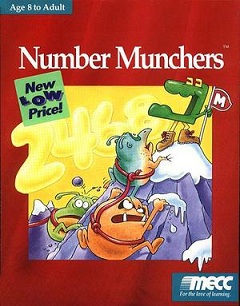 People generally sit down and playgames for fun and entertaining experiences. In contrast, theygenerally only learn math out of necessity or for financial desires. Rarely does "math" and "fun and entertainment"interact to any significant degree, as shown by the vast amount ofthe population who despises the various forms of math, if notoutright sucking at them. Certainly we can find math in somegameplay, given say a choice between various equippable items, butmodern games readily simplify the process, giving clear comparisonsif not outright displaying the superior choice. Games are certainlyrooted in math, down to the programming, but players are absolved ofsuch things, witnessing only the shiny results. However, a time andplace exists for such contradictions as math and fun, and NumberMunchers is just that contradiction.
People generally sit down and playgames for fun and entertaining experiences. In contrast, theygenerally only learn math out of necessity or for financial desires. Rarely does "math" and "fun and entertainment"interact to any significant degree, as shown by the vast amount ofthe population who despises the various forms of math, if notoutright sucking at them. Certainly we can find math in somegameplay, given say a choice between various equippable items, butmodern games readily simplify the process, giving clear comparisonsif not outright displaying the superior choice. Games are certainlyrooted in math, down to the programming, but players are absolved ofsuch things, witnessing only the shiny results. However, a time andplace exists for such contradictions as math and fun, and NumberMunchers is just that contradiction.
April 14, 2010 by Steve
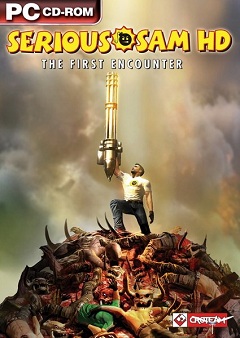 Serious Sam HD: The First Encounter isa recent remake of the fps classic, Serious Sam, both developed byCroteam. While I own the original Serious Sam Second Encounter, Ireally never played it, being somewhat put-off by the seeminglycheesy nature and waves of ugly enemies. But I recently got theupdate fairly cheap and decided to give it another shot. Afterquickly running through the demo level, I start the actual game here,so here we go... and if you wish, you can follow along with theyoutube playlist.
Serious Sam HD: The First Encounter isa recent remake of the fps classic, Serious Sam, both developed byCroteam. While I own the original Serious Sam Second Encounter, Ireally never played it, being somewhat put-off by the seeminglycheesy nature and waves of ugly enemies. But I recently got theupdate fairly cheap and decided to give it another shot. Afterquickly running through the demo level, I start the actual game here,so here we go... and if you wish, you can follow along with theyoutube playlist.
April 9, 2010 by Steve
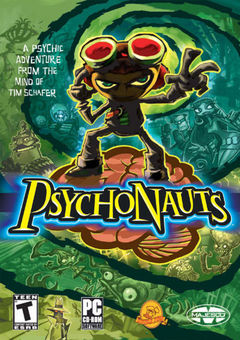 This Psychonauts Audio-Visual (half) Experience contains and displays some of the vibrant, shiny, brilliant, and clever content that exists throughout the game. Unfortunately, due to a variety of bugs that caused me crashes, missing graphical layers, strange periodic muted dialogue, control irregularities, memory leaks, and crippling fps drops, I did not have the heart to continue or even play the game for significant time each session. But there is no question that the game itself has heart and some clever, varied visual design, thus here we are...
This Psychonauts Audio-Visual (half) Experience contains and displays some of the vibrant, shiny, brilliant, and clever content that exists throughout the game. Unfortunately, due to a variety of bugs that caused me crashes, missing graphical layers, strange periodic muted dialogue, control irregularities, memory leaks, and crippling fps drops, I did not have the heart to continue or even play the game for significant time each session. But there is no question that the game itself has heart and some clever, varied visual design, thus here we are...
March 30, 2010 by Steve
 This spoiler-filledAudio Visual Experience of Time Gentlemen, Please! contains bothpotential puzzle/adventuring hints as well as possibly directspoilers, up to and including the ending of the game. If you areinterested in playing the game and have yet to do so (check the lessspoilertastic article on the game),then you may wish to avoid this article. Otherwise, enjoy theexperience of this fun little indie adventure game. Also as asidenote, due to a bug with the game engine, no dialogue was capturedon the images until the last few images, when some setting changesfixed the issue (as a result, somewhat reducing spoilering but alsoreducing fun). Warning: potential spoilers below.
This spoiler-filledAudio Visual Experience of Time Gentlemen, Please! contains bothpotential puzzle/adventuring hints as well as possibly directspoilers, up to and including the ending of the game. If you areinterested in playing the game and have yet to do so (check the lessspoilertastic article on the game),then you may wish to avoid this article. Otherwise, enjoy theexperience of this fun little indie adventure game. Also as asidenote, due to a bug with the game engine, no dialogue was capturedon the images until the last few images, when some setting changesfixed the issue (as a result, somewhat reducing spoilering but alsoreducing fun). Warning: potential spoilers below.
March 29, 2010 by Steve
 So as I'm moving through my Steambacklog, my next games are the adventure duo Ben There, Dan That! andits sequel Time Gentlemen, Please! Both are old-school 2d adventuregames, harking back to classics such as Maniac Mansion, Loom, MonkeyIsland and Sam & Max (admittedly, none of which I have playedaside from the free Sam & Max episode on Steam).
So as I'm moving through my Steambacklog, my next games are the adventure duo Ben There, Dan That! andits sequel Time Gentlemen, Please! Both are old-school 2d adventuregames, harking back to classics such as Maniac Mansion, Loom, MonkeyIsland and Sam & Max (admittedly, none of which I have playedaside from the free Sam & Max episode on Steam).
In case you aren't familiar with the PCadventure game genre, they're dialogue-heavy puzzle/detective gamesof a sort. You walk around, talk to people, pick things up, interactwith objects and generally figure out ways to progress to your nextor overall objective. It's generally very simple to play, notrequiring twitch skills or muscle memory like most modern games andcan be taken at whatever pace you wish. The humor of the games areby far their biggest draw, with large amounts of clever,lighthearted, endearing dialogue. Of course, then the dialogue isthe main draw of the genre and allows it to stand out over say, anelectronic version of Clue. Other significant factors towards thefinal product include ambience, intelligent pacing and a basic yeteffective control scheme. The genre as a whole has a fairly rabiddedicated fanbase. This is in contrast to the majority of the gamingworld, who doesn't even know that the genre exists.
Read moreMarch 22, 2010 by Steve
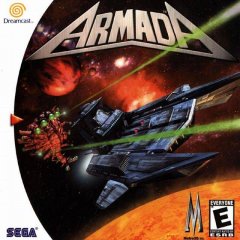 Time for a first hour review/chance totest out my capture card abilities. Today I'll be playing Armada, aDreamcast game semi-randomly selected from those in my possessionthat have not been previously played through. Well, I think Iactually played a few minutes of it when I got it, but nothing Iparticularly remember and certainly nothing particularly substantial. All I really recall is that it seemed to be received fairlypositively and was supposedly a fine multiplayer game. So anyway,let's try it out. If you want to follow along with the videoplaythrough, you can find it at my YouTube playlist.
Time for a first hour review/chance totest out my capture card abilities. Today I'll be playing Armada, aDreamcast game semi-randomly selected from those in my possessionthat have not been previously played through. Well, I think Iactually played a few minutes of it when I got it, but nothing Iparticularly remember and certainly nothing particularly substantial. All I really recall is that it seemed to be received fairlypositively and was supposedly a fine multiplayer game. So anyway,let's try it out. If you want to follow along with the videoplaythrough, you can find it at my YouTube playlist.
March 17, 2010 by Steve
 Here we have Mirror's Edge, a first-person platformer of sorts, released in late 2008/early 2009 by DICE/EA. I've been interested in the game for a while, starting from its strong marketing campaign, so I jumped on the chance to play it recently.
Here we have Mirror's Edge, a first-person platformer of sorts, released in late 2008/early 2009 by DICE/EA. I've been interested in the game for a while, starting from its strong marketing campaign, so I jumped on the chance to play it recently.
It can be briefly summarized that in Mirror's Edge, you are a runner, tasked to transfer information between groups looking to avoid the surveillance of an overbearing government and its allies. As escaping capture is of utmost importance, runners do most of their travel on free outdoor environments, especially rooftops. Thus the gameplay is largely parkour-based, emphasizing proper use of momentum, speed and techniques to accomplish goals. At its best, this leads to a smooth, sublime experience, reminiscent of games like Jet Set Radio, Shadow of the Colossus, NiGHTS, and the original Prince of Persia. Mirror's Edge takes the player further into that experience, locking you to a first-person view with constant reminders of your physical struggles with and against the forces of gravity and objects in your world.
Read moreMarch 1, 2010 by Steve
Welcome to Mass Effect: An Audio-Visual Experience.February 8, 2010 by Steve
Our second entry in this indie game month is a tower defense game by Studio Eres entitled Immortal Defense. I use the phrase "tower defense" lightly here, as while marketed as such, (Immortal Defense – a Tower Defense game), the creators only borrowed the genre basics and strived for much more than tower defense game #481.January 11, 2010 by Steve
What more can one say about Street Fighter? As explained in my previous review of Street Fighter: The Movie, the franchise is one of the most popular in gaming history and has permeated almost all aspects of society. It requires little backstory here, so let's head straight to the latest iteration.January 4, 2010 by Steve
Our first video review comes courtesy of Steve and one of the all time greatest arcade racing series: OutRun. Steve will be playing the 15 minute continuous cross-country run in OutRun 2006: Coast to Coast. It spans 15 very different levels with one common feature: lots and lots of powersliding. The game is beautiful, so here are two high definition videos of the run, complete with commentary about the game and series. Read moreNovember 23, 2009 by Steve
Ah, yes, the Street Fighter movie. No good phenomenon is safe from Hollywood's prying eyes, and Street Fighter was no exception. Street Fighter II was released in arcades in 1991, on consoles in 1992, and it quickly became a smash. Supremely polished with well-balanced 1v1 play, SFII jump-started the fighting game craze of the 90s, packing arcades as well as basements around the world. Capcom ultimately released 5 or so additional iterations of the game before moving on to Street Fighter Alpha and a continuation of the numbered series (along with a puzzle game, a simplified for-kids title and an outsourced 3d line).September 9, 2009 by Steve
The year is 1999; the date, September the ninth. The plants did their job and release day is here. The office was even more busy and tense than usual as all eyes followed the first projections emerging from the printer. We had every reason to be confident. All our test groups, all forecasters, all street teams gave nothing but guaranteed success. The mistakes and unfortunate failures of the past would soon wash away. No longer would we be forced the constant reminders of financial inadequacy or our loved ones' questioning about job security. Yes, my stress is lower, yes, I'm getting more sleep. These bags will be removed, hard work pays off. Sega is back! Segata Sanshiro is smiling somewhere, proud of his children. The only question is, how could so many people be so very wrong and so very blind?